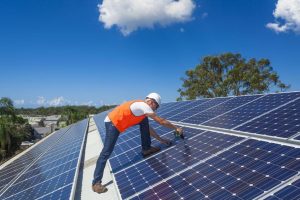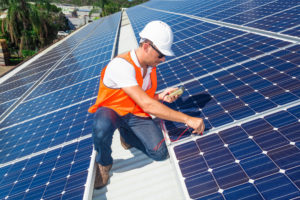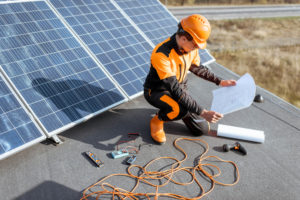With the increasing popularity of solar energy, understanding how to read and evaluate solar quotes is crucial when considering a solar panel system. In this article, we will delve into the components of a solar quote, discuss tips for comparing quotes, and provide insights on choosing the right solar installer. Let’s unlock the secrets of solar quotes and make informed decisions to go solar!
Contents
- 1 Key Takeaways
- 2 Understanding the Components of a Solar Quote
- 3 Evaluating Solar Installers and Companies
- 4 Comparing Solar Quotes
- 5 Understanding Terms and Conditions
- 6 Investing in Solar: Making an Informed Decision
- 7 Expert Insights From Our Solar Panel Installers About How to Read a Solar Quote
- 8 Experience Solar Excellence with Us!
- 9 Conclusion
Key Takeaways
- Understanding the components of a solar quote is crucial for evaluating the proposed solar panel system, including equipment, warranties, and installation costs.
- When evaluating solar installers and companies, consider factors such as reputation, experience, certifications, and customer support to ensure a successful installation.
- Comparing solar quotes involves assessing price per watt, equipment quality, financing options, system design, warranties, and services to make an informed decision. Understanding the terms and conditions outlined in the quote is essential to avoid surprises and ensure a transparent agreement.
Understanding the Components of a Solar Quote
A solar quote comprises several essential components that provide valuable information about the proposed solar panel system. Let’s dive deeper into each of these components:
Solar Panel System Details
The solar quote should provide comprehensive details about the solar panel system being offered. This includes the number and type of solar panels, the system size in kilowatts (kW), and the estimated annual solar production. Understanding these details is crucial as they directly impact the system’s capacity to meet your energy needs.
Number and Type of Solar Panels
Knowing the number of solar panels in the system allows you to assess the system’s size and potential energy generation. Additionally, understanding the type of solar panels, such as monocrystalline or polycrystalline, can provide insights into their efficiency and performance.
System Size and Solar Production
The system size, typically measured in kilowatts (kW), indicates the capacity of the solar panel system to generate electricity. The estimated annual solar production, measured in kilowatt-hours (kWh), approximates the energy the system is expected to produce over a year. This information helps you gauge the system’s ability to offset electricity consumption.
Solar Equipment and Inverters
Another crucial aspect of the solar quote is the equipment and inverters being proposed for your installation. Quality components are vital for your solar system’s long-term performance and reliability. Here are key considerations when evaluating the provided equipment:
Solar Panels
Pay attention to the solar panels brand, model, and efficiency rating. High-quality panels from reputable manufacturers often come with longer warranties and better performance in various weather conditions. Additionally, consider the panel’s degradation rate, which indicates how much its efficiency will decrease over time.
Inverters
Inverters are responsible for converting the solar panels’ direct current (DC) electricity into usable alternating (AC) electricity for your home. Assess the type of inverters proposed, such as string inverters, microinverters, or power optimizers. Each has advantages and considerations, including system-level performance monitoring and shade tolerance.
Installation Costs and Services
The solar quote should provide a breakdown of the installation costs and any additional services the installer offers. Understanding these costs and services is crucial for evaluating the overall investment required for your solar panel system. Consider the following:
Labor and Permit Costs
Labor costs encompass the installation team’s time and expertise to mount the solar panels, connect the wiring, and ensure the system is installed correctly. Permit costs refer to the fees associated with obtaining the necessary permits from local authorities.
Additional Services
Some installers may include additional services in their quotes, such as system design, maintenance, or monitoring. These services can provide added convenience and peace of mind, but it’s important to understand any associated costs and the extent of the services being provided.
Warranty
Evaluate the installer’s warranty for the solar panels and the installation work. A comprehensive warranty ensures that the installer will address any potential issues with the equipment or installation without incurring additional costs. Pay attention to the warranty duration and what it covers, including equipment performance, workmanship, and potential system malfunctions.
By understanding the components outlined in the solar quote, you can assess the proposed solar panel system’s quality, evaluate its value, and make an informed decision about your solar installation.

Evaluating Solar Installers and Companies
Choosing the right solar installer and company is crucial for a successful solar installation and long-term satisfaction with your solar panel system. Here are key factors to consider when evaluating potential solar installers:
Reputation and Experience
Research the installer’s reputation and customer reviews to gauge their industry track record and customer satisfaction. A reputable solar installer with positive reviews and a strong reputation is more likely to provide quality service and ensure a smooth installation process.
Additionally, consider the installer’s experience in the solar industry. An installer with years of experience has likely encountered a wide range of installation scenarios and can handle any challenges that may arise during your project.
Certifications and Credentials
Check if the installer holds relevant certifications and credentials, such as NABCEP (North American Board of Certified Energy Practitioners) certification. NABCEP certification indicates that the installer has undergone rigorous training and has demonstrated expertise in solar system design and installation.
Certifications from manufacturers can also be valuable. Some manufacturers offer training and certifications to installers who meet specific requirements. These certifications indicate that the installer has received manufacturer-endorsed training and is knowledgeable about the specific equipment they are installing.
Local Presence and Customer Support
Opting for a local solar company has its advantages. A local installer is familiar with the local permitting process and regulations, which can streamline the installation process. Additionally, a local presence ensures proximity for maintenance and support.
Consider the level of customer support provided by the installer. Will they be available to answer your questions before, during, and after the installation? Do they offer ongoing monitoring or maintenance services? A solar installer providing comprehensive customer support can give you peace of mind knowing that assistance is readily available.
When evaluating solar installers and companies, take the time to research their reputation, certifications, and customer support. Choosing the right installer ensures a high-quality installation and long-term satisfaction with your solar panel system.

Comparing Solar Quotes
Comparing solar quotes allows you to assess different offerings and make an informed decision about your solar panel system. Here are important factors to consider when comparing quotes:
Price per Watt
One way to compare quotes is by examining the price per watt (PPW) offered. PPW allows for a standardized comparison by dividing the total system price by the system size in watts. A lower PPW may indicate a more cost-effective option, but it’s important to consider other factors alongside price.
Equipment Quality
Assess the quality of the equipment proposed in each quote. Look for reputable brands with a proven track record of reliability and performance. High-quality solar panels and inverters will likely offer better efficiency, durability, and longer warranties. It’s worth investing in reliable equipment that will maximize the performance and lifespan of your solar panel system.
Financing Options
Consider the financing options presented in each quote. Solar installations can be financed through various methods, such as cash purchases, solar loans, leases, or power purchase agreements (PPAs). Evaluate each financing option’s terms, interest rates, and long-term savings. Choose the financing option that aligns with your financial goals and circumstances.
System Design and Specifications
Carefully review the system design and specifications presented in each quote. Pay attention to the number and type of solar panels and the overall system size and capacity. Compare these details to your energy needs and goals. Consider panel efficiency, estimated annual solar production, and system performance guarantees.
Warranty and Service
Evaluate the warranties provided in each quote. A comprehensive warranty that covers equipment, workmanship, and system performance is important for long-term peace of mind. Additionally, consider the level of ongoing support and maintenance services the installer offers. A solar company that stands behind its work and provides excellent customer service can enhance your solar panel system’s overall value.
By comparing multiple solar quotes based on price, equipment quality, financing options, system design, warranty, and service, you can make an informed decision that aligns with your needs and budget.

Understanding Terms and Conditions
When reviewing solar quotes, it’s essential to understand the terms and conditions stated in each quote. Here’s a closer look at the key aspects to consider:
Equipment and Installation Warranties
Review the warranties for solar panels, inverters, and installation work. Understand the duration of the warranties and what they cover. Look for warranties that provide comprehensive coverage for a reasonable period. A strong warranty protects you against potential equipment malfunctions and ensures the installer will rectify any issues at no additional cost.
Performance Guarantees and Solar Production Estimates
Pay attention to any performance guarantees mentioned in the quote. These guarantees ensure that the system will meet specified production levels. It’s important to understand the terms and conditions associated with these guarantees, including any criteria or limitations.
Additionally, consider the solar production estimates provided in the quote. These estimates help you gauge the system’s expected energy generation. However, keep in mind that actual solar production can vary based on factors like weather conditions, shading, and system maintenance.
Maintenance and Support Services
Examine the quote for any included maintenance or support services. Some solar companies offer ongoing monitoring, maintenance, or troubleshooting services to ensure optimal system performance. If applicable, understand what services are included, their frequency, and any associated costs. Robust maintenance and support services can provide added convenience and peace of mind.
Payment Terms and Financing Details
Carefully review the payment terms and financing details outlined in the quote. Understand the payment schedule, including any upfront deposits or progress payments. Review the terms, interest rates, and repayment period if you’re utilizing financing options like solar loans or leases. Ensure that the financing option aligns with your financial goals and preferences.
Terms and Conditions Specific to the Installer
Each solar installer may have their terms and conditions specific to their services. Review these carefully to understand the scope of work, installation timeline, and any additional obligations or responsibilities on your part. Pay attention to any clauses related to changes, cancellations, or additional charges that may apply during installation.
It’s crucial to thoroughly understand the terms and conditions stated in the quote to avoid any surprises or misunderstandings down the line. If you have any questions or need clarification, please get in touch with the solar installer for further explanation.

Investing in Solar: Making an Informed Decision
Investing in a solar panel system is a significant decision that can offer long-term benefits. Here’s how you can make an informed decision:
Comprehensive Evaluation
Take a holistic approach when evaluating solar quotes. Consider the overall value of the system rather than solely focusing on the initial cost. Assess equipment quality, warranty coverage, installer reputation, and ongoing support services. A thorough evaluation ensures that you choose a solar panel system that meets your needs and offers long-term value.
Seek Multiple Quotes
Obtain quotes from multiple reputable solar installers. This allows you to compare offerings, prices, and financing options. By gathering multiple quotes, you can gain a broader perspective and make an educated decision based on various options. Remember to evaluate the details of each quote carefully to ensure a fair comparison.
Consider Long-Term Benefits
Look beyond the immediate cost and consider the long-term benefits of your solar panel system. Evaluate the potential energy savings, increased property value, and positive environmental impact. Assess how the system aligns with your financial goals and long-term plans. Investing in quality equipment and reliable installation ensures your solar panel system performs optimally for years.
Consult with Solar Professionals
If you have any doubts or questions, consult with solar professionals or seek advice from experienced individuals in the solar industry. They can provide insights, clarify concerns, and guide you through decision-making. Their expertise can help you make a more informed choice and ensure that your investment in solar energy is well-planned and beneficial.
Consider Financing Options
Evaluate the financing options available to you. Research and compare solar loans, leases, power purchase agreements (PPAs), and other financing methods. Consider each option’s terms, interest rates, repayment periods, and potential long-term savings. Choose a financing arrangement that aligns with your financial goals and allows you to maximize the benefits of solar energy.
Consult with Others
Seek advice and recommendations from friends, family, or colleagues who have already installed solar panel systems. Their firsthand experiences can provide valuable insights into the installation process, interactions with solar installers, and the overall performance of their systems. Learn from their experiences and consider their recommendations when making your decision.
Trust Your Instincts and Do Your Due Diligence
Trust your instincts and conduct thorough research before making your final decision. Review all the information gathered from solar quotes, evaluations of installers, and financial considerations. Take the time to compare and analyze the details. Don’t hesitate to seek additional information or clarification if something doesn’t feel right or you have lingering questions.
By following these steps and making an informed decision, you can confidently invest in a solar panel system that aligns with your energy needs, financial goals, and environmental values. Going solar is a significant step towards reducing your carbon footprint and embracing a sustainable future.
Expert Insights From Our Solar Panel Installers About How to Read a Solar Quote
Understanding the breakdown of costs in a solar quote is essential. Ensure that each component, from solar panels to inverters and installation fees, is clearly outlined. Transparency in the quote helps in avoiding hidden costs and ensures you get the best value for your investment.
Senior Solar Installer
Comparing quotes isn’t just about looking at the price per watt. Evaluate the quality of the equipment, the warranty terms, and the experience of the installation company. A cheaper quote might save you money upfront but could cost you more in the long run if the components are of lower quality.
Lead Solar Engineer
Always ask about the performance guarantees and after-sales services included in the quote. Reliable companies will offer robust support and maintenance services to ensure your solar system operates efficiently for years.
Solar Installation Specialist
Experience Solar Excellence with Us!
Trust in Solar Panels Network USA, where our seasoned experts deliver top-quality solar solutions for homes and businesses nationwide. With a legacy of countless successful installations and a commitment to sustainable energy, we’re your reliable partner in the solar journey. Ready for a brighter, eco-friendly future? Call us now at (855) 427-0058 and harness the power of the sun!
Conclusion
Understanding how to read a solar quote is crucial when considering a solar panel system. By comprehending the components of a quote, evaluating solar installers, comparing quotes, understanding terms and conditions, and making an informed decision, you can embark on a successful solar journey.
Remember to carefully assess the details of each quote, including the solar panel system components, warranties, financing options, and terms and conditions. Consider the reputation and experience of solar installers and the ongoing support they provide. Compare multiple quotes, seek clarification when needed, and evaluate the long-term value and benefits of the proposed systems.
Investing in solar energy is not just about saving money or reducing reliance on fossil fuels—it’s about contributing to a cleaner and more sustainable future. Embrace the power of solar energy and positively impact the environment, your finances, and your energy independence.
Unlock the potential of solar energy, understand the intricacies of solar quotes, and decide to go solar today!
About the Author
Solar Panels Network USA stands at the forefront of solar energy solutions, driven by a team of seasoned solar engineers and energy consultants. With over decades of experience in delivering high-quality solar installations and maintenance, we are committed to promoting sustainable energy through customer-centric, tailored solutions. Our articles reflect this commitment, crafted collaboratively by experts to provide accurate, up-to-date insights into solar technology, ensuring our readers are well-informed and empowered in their solar energy decisions.

